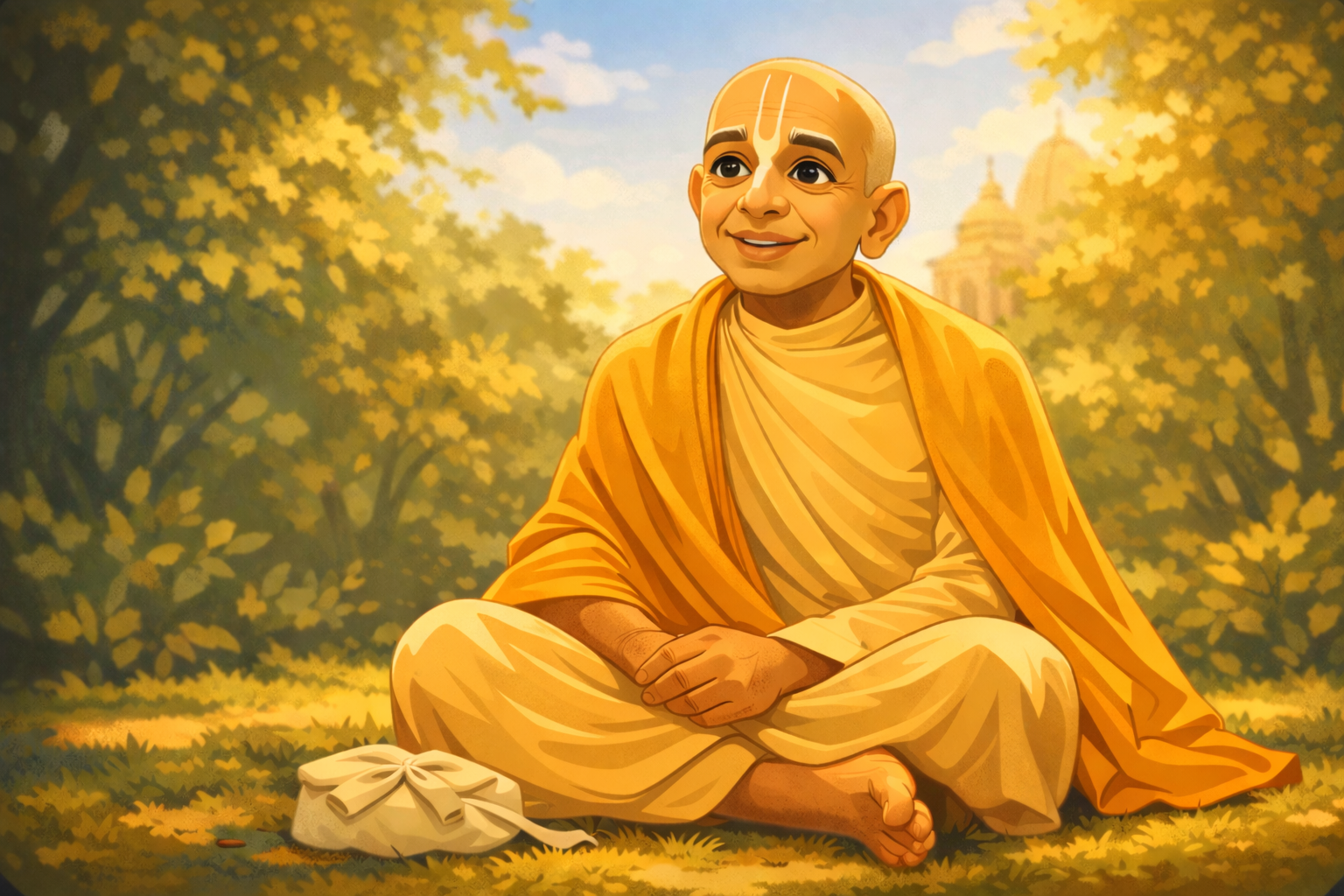On September 1, 1896, in Kolkata, India, a boy was born into a devout Vaishnava family. His parents named him Abhay Charan De — “one who is fearless, having taken shelter at the feet of God.”
As a child, Abhay was fascinated by temple rituals, kirtans (devotional singing), and stories of Krishna. At five, he organized his own little Ratha Yatra (chariot festival) in the neighborhood, pulling a handmade cart as other children joined in. It was a seed of devotion that would one day grow into a global movement.
“My dear Lord Krishna, I have no devotion. Nor do I have any knowledge, but I have strong faith in the holy name of Krishna.”
The Meeting with a Guru
Abhay studied at Scottish Church College in Kolkata, where he absorbed both Western thought and Indian philosophy. He married, worked as a manager for a pharmaceutical company, and lived the life of a householder.
But destiny called in 1922, when he met Bhaktisiddhanta Sarasvati Thakur, a prominent spiritual teacher of the Gaudiya Vaishnava tradition. Bhaktisiddhanta urged him:
“You are an educated young man. Why don’t you preach Lord Chaitanya’s message in English to the Western world?”
Those words stayed with Abhay for decades.
A Life of Preparation
In 1933, Abhay became Bhaktisiddhanta’s initiated disciple, receiving the name Abhay Charanaravinda. He began writing articles, translating scriptures, and slowly dedicating more of his life to service.
In 1944, amidst the chaos of World War II, he started a magazine called Back to Godhead, typing, editing, and distributing it himself. In 1959, he renounced family life, took sannyasa (the order of renunciation), and was given the name by which the world would know him: A. C. Bhaktivedanta Swami Prabhupada.
“Spiritual life means stopping the repetition of birth and death, and going back to our original home, back to Godhead.”
A Journey Across the Ocean
In 1965, at the age of 69, with barely forty rupees in his pocket and a trunk of books, Prabhupada boarded a cargo ship, the Jaladuta, bound for New York.
The voyage was perilous. He suffered two heart attacks at sea. Yet he pressed on, convinced that Krishna had brought him for a mission: to share the timeless teachings of the Bhagavad Gita with the modern world.
The Birth of ISKCON
In New York’s Lower East Side, among hippies, seekers, and countercultural youth, Prabhupada began teaching. His chanting of the Hare Krishna mantra in Tompkins Square Park drew curious crowds.
In 1966, he formally established the International Society for Krishna Consciousness (ISKCON). What began as a handful of disciples soon spread to dozens of temples, farm communities, and cultural centers across America, Europe, and beyond.
“Chant Hare Krishna and your life will be sublime.”
The Author of a Movement
Prabhupada was not only a teacher but a prolific author. He translated and wrote commentaries on sacred texts, including the Bhagavad Gita As It Is and the monumental Srimad Bhagavatam, bringing ancient Sanskrit wisdom to a global audience in clear, accessible language.
The Final Years
For twelve years, Prabhupada traveled tirelessly — more than a dozen times around the world — teaching, initiating disciples, and spreading Krishna consciousness.
On November 14, 1977, in Vrindavan, the sacred land of Krishna, Srila Prabhupada left his body. His movement, however, had already spread across six continents, his books translated into dozens of languages, and his disciples carrying forward his mission.
The Legacy of Srila Prabhupada
Srila Prabhupada gave the world more than a movement; he gave it a reminder of devotion in an age of distraction, of simplicity in an age of excess.
“Devotional service is not a matter of rules and regulations. It is a matter of love.”
From the streets of New York to temples in India, from farm communities to university libraries, his voice still resonates through chants, books, and the millions whose lives were transformed by his call:
“Hare Krishna, Hare Krishna, Krishna Krishna, Hare Hare. Hare Rama, Hare Rama, Rama Rama, Hare Hare”
“I am not a magician. I am simply presenting the words of Krishna without adulteration.”
“One who thinks himself lower than the straw in the street, who is more tolerant than a tree, and who does not expect personal honor, but is always prepared to give all respect to others, can very easily always chant the holy name of the Lord.”
“The highest perfection of human civilization is to give everyone a chance to become Krishna conscious.”
